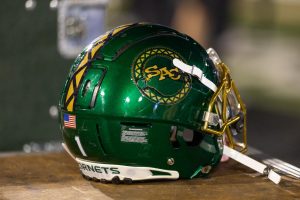Student reaches for moon with research
October 15, 2009
When he was in high school, Javier Gonzalez-Rocha’s guidance counselor told him to pick something else to pursue in college besides mechanical engineering. The answer did not sit well with the kid whose sixth grade class once got to create classroom explosions in the pursuit of academic excellence.
Since then, Gonzalez-Rocha has gone even further than his doubter might have imagined. He received the California Strawberry Commission 2010 scholarship and is working on a research paper to be presented to NASA this fall.
“I didn’t take no for an answer,” Gonzalez-Rocha said. “I guess it just got me mad.”
Gonzalez-Rocha said he used his anger to fuel his motivation to come to Sacramento State in 2005 and study mechanical engineering.
The scholarship is awarded each year to children of strawberry field workers and is based on academic merit and community service.
While earning this scholarship has not gone unnoticed, it is the presentation of Gonzalez-Rocha’s research paper that has his friends and family predicting a very successful life ahead of him. He said having so much focus on him now is a bit unnerving.
“I’m not used to all of this attention,” Gonzalez-Rocha said.
His paper examines the factors for why so few Latinos consider engineering as a career option. Gonzalez-Rocha chose the topic because it related closely to his own experience in high school, where he said the school’s objective was to merely get students to pass standardized tests.
Jose Granda, professor of mechanical engineering department, has known Gonzalez-Rocha for three years.
As the campus director for the California Space Grant Consortium, which funds aerospace-related projects, Granda submits applications to the consortium on behalf of Sac State and recommended Gonzalez-Rocha be funded for his research project.
“This is a crucial project because NASA is developing the workforce of the future,” Granda said. “The geniuses that put the man on the moon are retiring.”
Granda is a NASA Faculty Fellow, which means engineers from NASA regularly contact him for consultation.
Students like Gonzalez-Rocha often help develop computer simulation models of the space station and shuttle missions.
Gonzalez-Rocha has recently been working on the Constellation Project to send humans back to the moon.
“He’s going to be doing the computer model of the Constellation Project to understand the control system and modes of vibration,” Granda said. “These are the games that the big boys in engineering play.”
Gonzalez-Rocha’s younger sister Liliana Gonzalez said their family always suspected Javier might one day become an engineer because he was always playing with toys.
She said that their mother would frequently get mad at Javier for disassembling small radio sets, only to put them back together again.
The siblings used to help out at their parents’ work in the strawberry fields during the summer in Watsonville, where they grew up. Gonzalez attributes her brother’s academic dedication to the grueling physical labor and sweltering heat of the fields.
“We come from a working family, we were taught to look forward,” Gonzalez said. “I think that him experiencing that ? pushes him every time.”
Gonzalez-Rocha said that in his high school graduating class at Aptos High School, there were just five Latino males, including himself.
Julia Baum can be reached at [email protected]




























































































































